- Home
- Tim LaHaye
John's Story: The Last Eyewitness Page 7
John's Story: The Last Eyewitness Read online
Page 7
As John put out his empty plate, Ignatius accosted him. “Polycarp is back from the markets,” the Antiochan reported. “Are we about ready to commence?”
“We?”
“You and Polycarp, I mean.”
“Yes, and as much as I know you want to be involved, Ignatius, have we not agreed that someone, someone we all know and love—you, in fact—must take over our duties here until the time you set sail?”
“In fact,” Ignatius said, “do you not find it providential that the Lord sent me here for what I thought was mere filling in so you could get some rest, but had no doubt ordained this very work before even putting the thought in my head to come?”
“I do indeed,” John said, his eyes shining. “We serve a good God.”
Polycarp rushed in, laden with supplies. “What?” he said, his gaze alternating between the men. He smiled at Ignatius. “I do not know what your business is here, sir, but if you would kindly move on, we have important duties.”
“Let me help you,” Ignatius said, and when Polycarp hesitated, Ignatius added, “help you arrange everything. Then I’ll be on my way.”
Ignatius and Polycarp spread the papyrus on the desk, filled the inkwell, and arranged the quills. “I will need to be able to move, to walk, to see out the window,” John said. And so they cleared a path for him in the tiny chamber. Polycarp situated the chair to give himself plenty of room to work while staying out of John’s way.
Once everything was set, the three looked at one another awkwardly. Ignatius broke the silence. “I have a meeting with the deacons and deaconesses in a few moments. Lord’s Day preparations. But first, may I make a request? You both have to know how difficult it is for me to remain on the periphery of this great effort. You must promise that at the end of the day, after I have been faithful in filling in for you both here the best I know how, that you, Polycarp, will tell me all you can remember. Will you do that?”
“With John’s permission,” Polycarp said.
“Of course!” John said. “I covet your evaluation of each day’s work, my friend. Feel free to pore over the manuscript with Polycarp.”
“Thank you, John. Thank you from my heart. And now, dear brethren, I believe the Lord would have me pray for you.”
Ignatius had John sit in the chair and Polycarp kneel beside him. He placed his hands atop their heads and lifted his eyes to heaven. “Our great God and Father of our Lord and Savior Jesus Christ, hallowed be Your name. I beseech You this day on behalf of these two, my friend and my mentor, believing that You have called them and set them apart for an enterprise sacred and holy. You confirmed within both their hearts that this mission is of You, and You brought them through valleys of purging to make of them pure vessels for Your use.
“I pray You would quicken John and fill him with Your Spirit, flooding his heart and mind and soul with what You would have him record. And I pray that the result of this divine work will settle any question of the deity of Your Son, refuting heresies that blaspheme the truth of His identity. We offer our thanks for the privilege of having a part in this, and may we never be the same because of it. I pray in the holy and matchless name of Your dear Son, Jesus the Christ. Amen.”
SEVEN
Unaware until he opened his eyes that Ignatius had left and quietly pulled the door shut behind him, John silently rose and moved to the other end of the room. Polycarp slipped into the chair and took quill in hand, dipping it into the ink until the liquid was drawn into the stem. John was aware of Polycarp’s eyes, showing his readiness, but John was also determined not to utter one word he was not entirely convinced was from the mouth of God Himself.
John steepled his index fingers and pressed them against his lips as he slowly walked to the window and back, thinking, open to the leading of the Spirit, listening for that still, small voice. And as John painstakingly began to softly speak, Polycarp applied the ink to the page.
According to John
In the beginning was the Word, and the Word was with God, and the Word was God. He was in the beginning with God. All things were made through Him, and without Him nothing was made that was made.
Polycarp looked up, trembling. “Master, it is as if I am in the presence of the Almighty. You are speaking with His authority.”
“I too feel it, son.
“In Him was life, and the life was the light of men. And the light shines in the darkness, and the darkness did not comprehend it.”
John sat on the bed, folding his arms and hanging his head as if exhausted. Finally he whispered, “I need tell of the baptizer. Bear with me as I ponder this, Polycarp.” He sat another moment, then lifted his head. “All right,” he said. “Thank you, Lord.
“There was a man sent from God, whose name was John. This man came for a witness, to bear witness of the Light, that all through Him might believe.”
“Pardon me, rabbi,” Polycarp said. “Just so I understand. ‘That all through John might believe’?”
The old man nodded.
“He was not that Light, but was sent to bear witness of that Light. That was the true Light which gives light to every man coming into the world.
“He was in the world, and the world was made through Him, and the world did not know Him. He came to His own, and His own did not receive Him. But as many as received Him, to them He gave the right to become children of God, to those who believe in His name: who were born, not of blood, nor of the will of the flesh, nor of the will of man, but of God.”
“Give me a moment, master,” Polycarp said. “This is overwhelming. I have never heard anything like it.”
“Nor have I. Tell me when you are ready.”
“Ready.”
“And the Word became flesh and dwelt among us, and we beheld His glory, the glory as of the only begotten of the Father, full of grace and truth.
“John bore witness of Him and cried out, saying, ‘This was He of whom I said, “He who comes after me is preferred before me, for He was before me.”’
“And of His fullness we have all received, and grace for grace. For the law was given through Moses, but grace and truth came through Jesus Christ. No one has seen God at any time. The only begotten Son, who is in the bosom of the Father, He has declared Him.
“You know, Polycarp, I was a disciple of the baptizer before I met Jesus.”
“So you heard him say these things yourself?”
John nodded. “I recall well when the Jews sent priests and Levites from Jerusalem to ask him, ‘Who are you?’
“He told them boldly and forthrightly, ‘I am not the Christ.’
“And they asked him, ‘What then? Are you Elijah?’
“He said, ‘I am not.’
“‘Are you the Prophet?’ they wanted to know.
“And he answered, ‘No.’
“Polycarp, they were most frustrated. They said, ‘Who are you, that we may give an answer to those who sent us? What do you say about yourself?’
“He said: ‘I am “The voice of one crying in the wilderness: ‘Make straight the way of the Lord,’” as the prophet Isaiah said.’”
“Pardon me, rabbi,” Polycarp said, “but who were these who questioned him?”
“They had been sent from the Pharisees. And they asked him, ‘Why then do you baptize if you are not the Christ, nor Elijah, nor the Prophet?’
“The baptizer answered, ‘I baptize with water, but there stands One among you whom you do not know. It is He who, coming after me, is preferred before me, whose sandal strap I am not worthy to loose.’”
“Where was this, sir?” Polycarp said.
“In Bethabara beyond the Jordan, where John was baptizing. Now listen, because this next marks the first time I saw the Lord.”
“What must that have been like?”
“You cannot imagine. The next day the baptizer saw a man coming toward him, and said, ‘Behold! The Lamb of God who takes away the sin of the world! This is He of whom I said, “After me comes a Man who is preferred before me, for He was
before me.” I did not know Him; but that He should be revealed to Israel, therefore I came baptizing with water.’
“Now, Polycarp, James and I stood there, mouths agape. The baptizer had been preaching about the Messiah in our presence for so long that we had begun to wonder if we would ever see Him. And suddenly there He was. I was well aware of the Scriptures that foretold that He would have ‘no form nor comeliness; and when we see Him, there is no beauty that we should desire Him,’ so I was not surprised that He was not handsome. But as for me, I confess I was surprised at how plain He at first appeared. I am speaking now only of his features, the cut of his face. He merely looked like one of us, but James and I both agreed later that there was something about his bearing, his carriage. Perhaps it was because John the Baptist immediately identified Him, I don’t know. But there seemed such a peace and serenity about this Man, it was as if I imagined all the knowledge of the universe resided in Him.
“The baptizer had said that God Himself, the one who had sent him to baptize with water, had told him, ‘Upon whom you see the Spirit descending, and remaining on Him, this is He who baptizes with the Holy Spirit.’ And Polycarp, that is what I saw, the Spirit descending from heaven like a dove and remaining on that Man. Even the baptizer admitted that he did not know this Man—surprising when you realize that they were cousins—but the Spirit descending on Him made it plain to all of us who He was. John said, ‘I have seen and testified that this is the Son of God.’
“This remains with me as if it were yesterday. When John baptized Him and He rose up out of that water, the heavens opened and a voice said, ‘This is my beloved Son, in whom I am well pleased.’ You can imagine, then, why it so infuriated me when Cerinthus represented as fact that Jesus was not the Son of God.”
Polycarp nodded.
“The next day, I was standing with my friend Andrew—another of John’s disciples—as Jesus approached again. John said, ‘Behold the Lamb of God!’”
“This is Peter’s brother, Andrew?”
John nodded. “Polycarp, I was so drawn to Jesus that I could barely tear my eyes away. I looked to the baptizer—for permission, I suppose. We were his disciples, after all. And I noticed that Andrew was doing the same, merely looking to John for the freedom to follow Jesus. The baptizer smiled knowingly and nodded, and we moved quickly to fall in step with the Lord.
“Jesus turned, and seeing us following, said, ‘What do you seek?’”
John laughed and shook his head. “Polycarp, I didn’t know what to say. And Andrew was clearly at a loss. I said, ‘Rabbi, where are You staying?’”
Polycarp dropped his quill and roared. “You asked Him that?”
“I didn’t know what else to say.”
“And how did He answer?”
John nodded to Polycarp to signal him to keep writing.
“He said, ‘Come and see.’ We went and saw where He was staying, and remained with Him that day.
“Then Andrew ran to find his brother and said, ‘Peter, we have found the Messiah.’ And he brought Peter to Jesus.
“As soon as Jesus saw Peter, He said, ‘You are Simon the son of Jonah. You shall be called Cephas,’ which, as you know, means ‘stone.’”
“Jesus knew who he was?”
John nodded. “He was God, son. He knew everything.”
“And how were the others called?”
“The next day we followed Jesus to Galilee, and He found Philip and said, ‘Follow Me.’ Philip was from Bethsaida, the city of Andrew and Peter. Philip found Nathanael and said, ‘We have found Him of whom Moses in the law, and also the prophets, wrote—Jesus of Nazareth, the son of Joseph.’
“Nathanael was skeptical. He said, ‘Can anything good come out of Nazareth?’”
“He actually said that?” Polycarp said.
John smiled. “This would be the wrong place to be making up stories, would it not? Philip said to him, ‘Come and see.’
“When Jesus saw Nathanael coming toward Him, He said, ‘Behold, an Israelite indeed, in whom is no deceit!’”
“He knew Nathanael too?”
“I told you, Polycarp. He knew all. Nathanael was as astounded as you are. He said, ‘How do You know me?’
“And Jesus said, ‘Before Philip called you, when you were under the fig tree, I saw you.’”
“You never told me this before, master,” Polycarp said. “If Jesus had said something like that to me, I would have known without question that—”
“You’re getting ahead of me.”
“Sorry.”
“Nathanael immediately said, ‘Rabbi, You are the Son of God! You are the King of Israel!’
“Jesus said, ‘Because I said to you, “I saw you under the fig tree,” do you believe? You will see greater things than these. Most assuredly, I say to you, hereafter you shall see heaven open, and the angels of God ascending and descending upon the Son of Man.’”
EIGHT
Following a brief rest, John and Polycarp decided to get some air and exercise and venture out onto the stone streets of Ephesus. John was growing concerned about pressure in his chest and a dull ache behind his breastbone, but he chose not to mention this to his young friend.
“John the Baptizer must have been a fascinating man,” Polycarp said. “What drew you to him?”
“Well, he was a man of nature, not unlike my brother and me. But he was not a fisherman—he spent his time in the wilderness, eating off the land.”
“Locusts and honey.”
John smiled. “Matthew writes of the baptizer as I remember him, wandering the hills of Judea wearing a covering made from the skin of a camel, hair and all. He also wore a thick leather belt. Not a city man.”
“Yet he became known. How did people find him out there?”
“Frankly, Polycarp, the man was a curiosity. He would venture close to the highways and byways, and whenever a crowd, or even a small group, passed, he would begin to preach. I daresay that early on most considered him a madman, ranting and raving in the wilds.”
“But you did not see him that way.”
“At first we did. In fact, James and I were on our way to deliver some fish and had to move out of the road as an entourage passed coming from the other way. It was obviously some dignitary, his curtained carriage surrounded by servants and slaves and animals. They were kicking up quite the dust storm.
“Well, just before they reached us, James nudged me and nodded in the direction of the strange man on the hillside, crouching by a rock and watching the road. In James’s eyes I read mischief. He probably thought the man a lunatic and considered making sport of him.
“But when that caravan drew near us, the man began to shout and gesture. ‘Beware!’ he cried, ‘the kingdom of heaven is at hand!’
“James raised his eyebrows and looked at me, on the verge of laughter. He whispered, ‘Oh, it is, is it?’ And as if the man had heard James, he shouted, ‘Yes, it is!’
“James froze and stared as the man ventured down from the hillside and commanded the caravan to stop. The dignitary, I still know not who he was, demanded to know what was the holdup. Well, the man we eventually came to know as John the Baptizer took command. He stood at the side of the road proclaiming the imminent coming of the promised one, the Deliverer of Israel. And when the official commanded his people to move again, the baptizer roared, ‘You ignore the signs at your peril, for surely the day is coming when you will fall on your knees before the King!’
“The master swept back the veil of his traveling chamber and glared out at John, demanding, ‘Are you a bandit? If you are, show your weapon so I may instruct my guards to kill you.’
“John fired back, ‘You threaten the anointed one of God, the forerunner of the Messiah? You are a snake, a viper, a fornicator, a liar!’
“‘Kill him!’ the diplomat yelled, but as his men drew their swords, John rushed forward, clearly unarmed.
“‘Beware, for I come to you under the authority of the Most High God. You
shall bring no harm to me. Examine yourself, O representative of Rome, and woe to you if you are found wanting at that great and terrible day!’
“That must have scared even the official, because the caravan soon rumbled from sight. I was young, about the age you are now, and this wild man frightened me. I urged James that we should be about our business, but he was plainly curious. ‘You are anointed of God?’ he said.
“‘Call me John,’ the baptizer said.
“‘That is my name too,’ I managed.
“‘And you are brothers,’ he said, ‘fishermen, on your way to market.’
“Polycarp, I was taken aback. I said, ‘Surely you must be of God to know that.’ And with that the crazy man threw his head back and laughed loud and long.
“He said, ‘It takes no otherworldly ability to divine this! You look alike, you smell of fish, you are carrying salted fish containers, and you are headed toward town in the middle of the day.’
“I felt foolish, but I could not be angry, as he said this with such good humor. James had lost his mischief, and while the man looked all the more uncivilized the closer we got to him—uncut hair and unshaved beard—the more we sensed something in his eyes and in his voice. While he had rasped and growled while chastising the public official, his natural tone of voice was low and soothing. He was so earnest. He told James and me that he would be glad to tell us of the coming Messiah. We had heard of this for years in our synagogue school, and I confess that we did not believe him at first. But it didn’t take long being around him to know that he was no madman.
“Word spread throughout the region that he was preaching in the wilderness and baptizing people, and they began to come from all over.
“We spent many days with John, learning from him and witnessing his bold approach to announcing the coming of the Lord.
“When my brother James left the baptizer, he urged John to be careful about so brazenly calling down government and religious leaders. ‘You could get yourself killed.’
“‘That is why I am here,’ John told us. But we had no idea what he meant.”

 Glorious Appearing: The End of Days
Glorious Appearing: The End of Days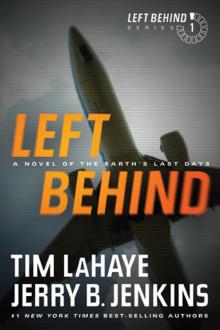 Left Behind: A Novel of the Earth's Last Days
Left Behind: A Novel of the Earth's Last Days Kingdom Come: The Final Victory
Kingdom Come: The Final Victory Nicolae: The Rise of Antichrist
Nicolae: The Rise of Antichrist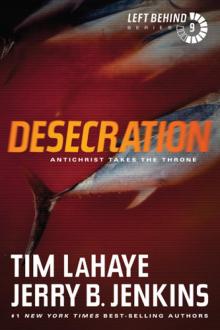 Desecration: Antichrist Takes the Throne
Desecration: Antichrist Takes the Throne Mark's Story: The Gospel According to Peter
Mark's Story: The Gospel According to Peter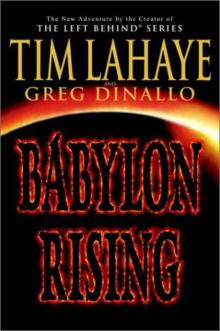 Babylon Rising
Babylon Rising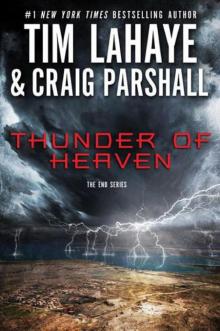 Thunder of Heaven: A Joshua Jordan Novel
Thunder of Heaven: A Joshua Jordan Novel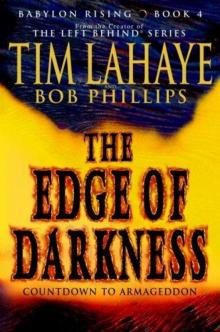 The Edge of Darkness
The Edge of Darkness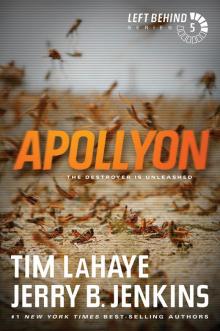 Apollyon: The Destroyer Is Unleashed
Apollyon: The Destroyer Is Unleashed Armageddon: The Cosmic Battle of the Ages
Armageddon: The Cosmic Battle of the Ages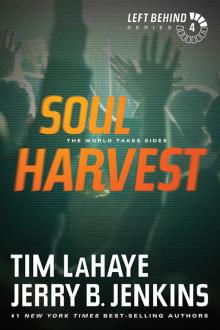 Soul Harvest: The World Takes Sides
Soul Harvest: The World Takes Sides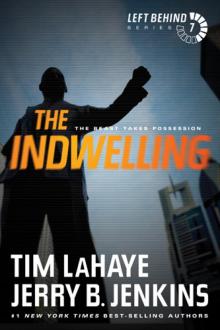 The Indwelling: The Beast Takes Possession
The Indwelling: The Beast Takes Possession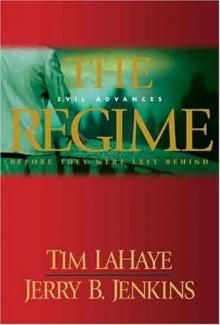 The Regime: Evil Advances
The Regime: Evil Advances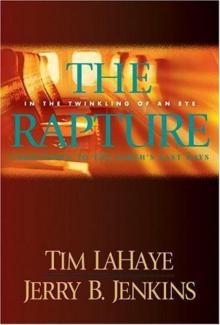 The Rapture: In the Twinkling of an Eye / Countdown to the Earth's Last Days
The Rapture: In the Twinkling of an Eye / Countdown to the Earth's Last Days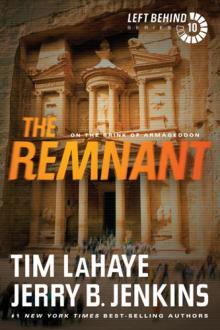 The Remnant: On the Brink of Armageddon
The Remnant: On the Brink of Armageddon John's Story: The Last Eyewitness
John's Story: The Last Eyewitness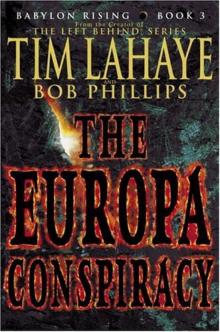 The Europa Conspiracy
The Europa Conspiracy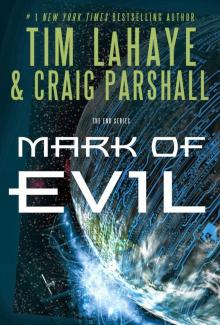 Mark of Evil
Mark of Evil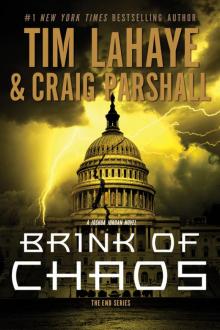 Brink of Chaos
Brink of Chaos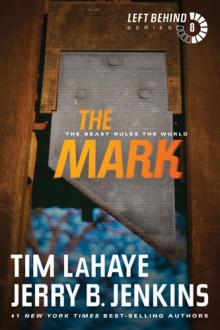 The Mark: The Beast Rules the World
The Mark: The Beast Rules the World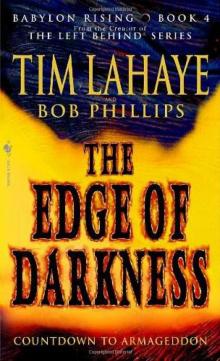 04 The Edge of Darkness
04 The Edge of Darkness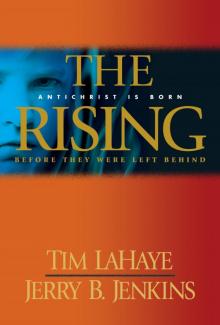 The Rising: Antichrist is Born / Before They Were Left Behind
The Rising: Antichrist is Born / Before They Were Left Behind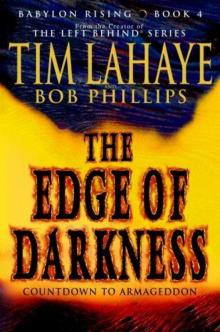 Babylon Rising: The Edge of Darkness
Babylon Rising: The Edge of Darkness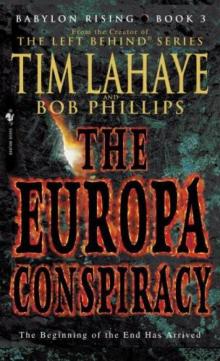 03 The Europa Conspiracy
03 The Europa Conspiracy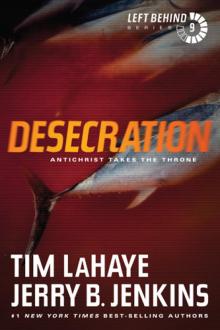 Desecration
Desecration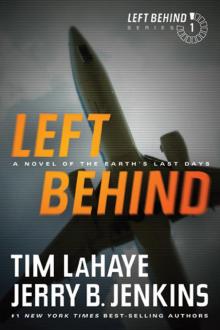 Left Behind
Left Behind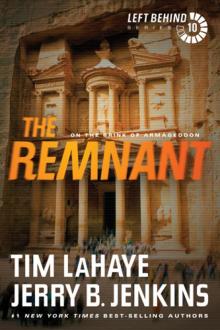 The Remnant
The Remnant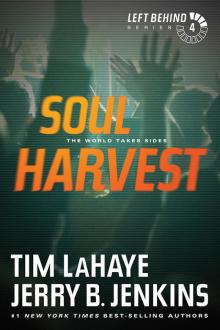 Soul Harvest
Soul Harvest Left Behind Book 13: Kingdom Come The Final Victory
Left Behind Book 13: Kingdom Come The Final Victory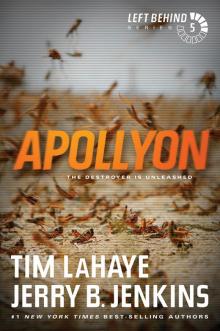 Apollyon
Apollyon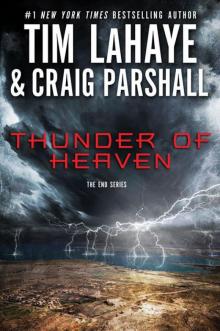 02 Thunder of Heaven: A Joshua Jordan Novel
02 Thunder of Heaven: A Joshua Jordan Novel Glorious Appearing
Glorious Appearing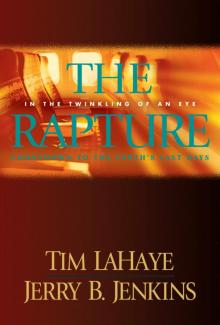 The Rapture: Evil Advances / Before They Were Left Behind
The Rapture: Evil Advances / Before They Were Left Behind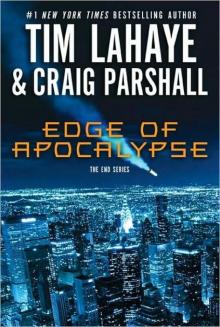 Edge of Apocalypse
Edge of Apocalypse Tribulation Force
Tribulation Force The Left Behind Collection: All 12 Books
The Left Behind Collection: All 12 Books Black Friday
Black Friday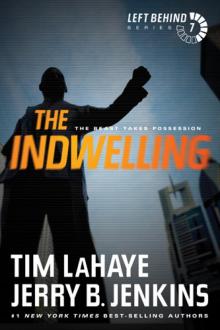 The Indwelling
The Indwelling The Left Behind Collection
The Left Behind Collection